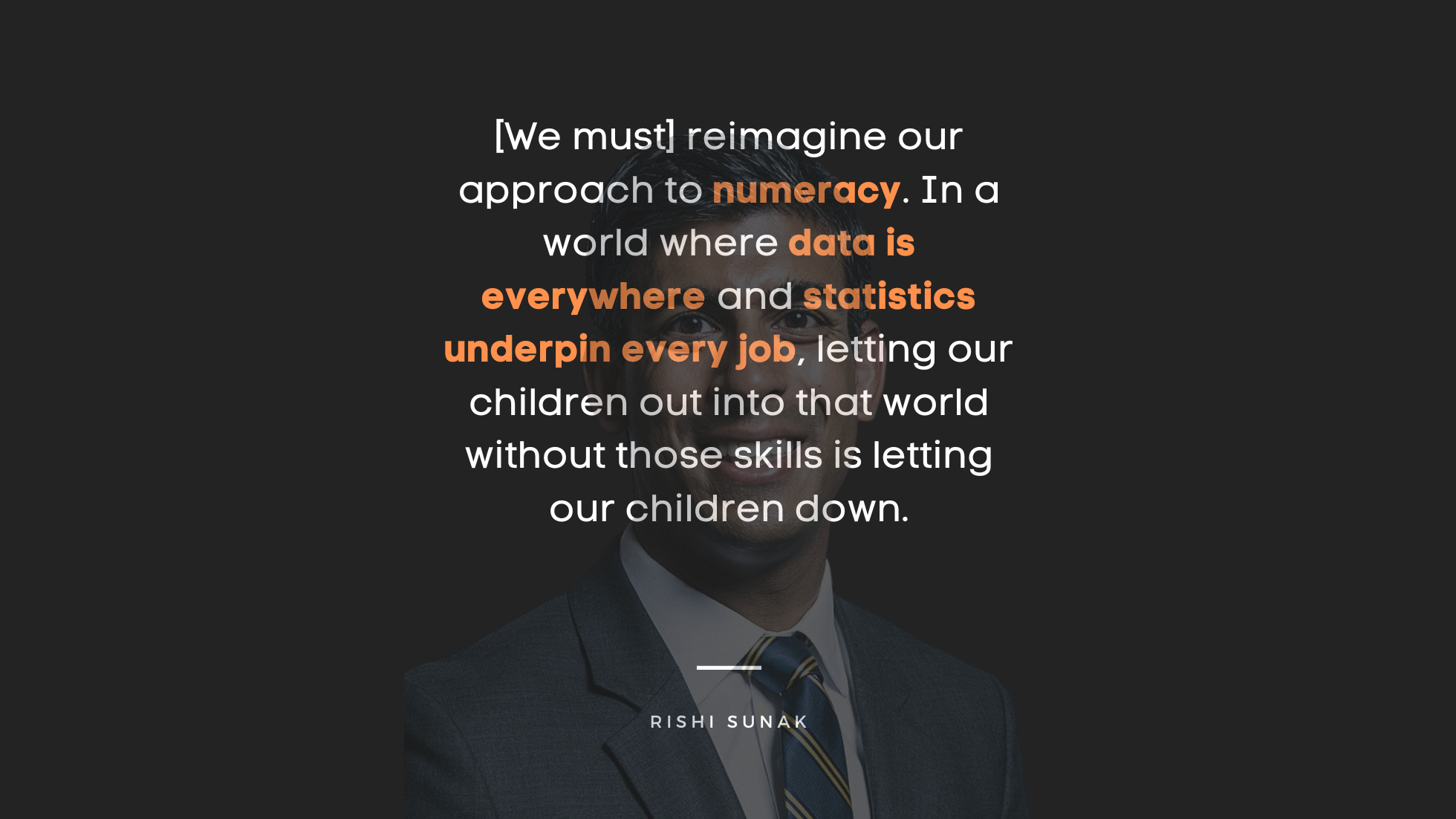The way math is taught across the world is as varied as how education itself is approached. While it’s not without controversy (and what isn’t?), the UK has taken steps to promote numeracy within its borders.
Prime Minister Rishi Sunak recently announced that math would be required for all children every year through to age 18, an increase from the current required age of 16. Currently, only half of the students age 16 through 19 study math in the UK.
[We must] reimagine our approach to numeracy. In a world where data is everywhere and statistics underpin every job, letting our children out into that world without those skills is letting our children down.
Rishi Sunak, Prime Minister of the United Kingdom
One of the main arguments against this move is that such a move would require a significant boost in hiring qualified math educators.
While not minimizing such logistical and practical objections, examining the underlying driver behind the move is still essential. Kit Yates, the Director of the Centre for Mathematical Biology at the University of Bath, states:
It’s true that better levels of numeracy in the population would benefit everyone – and not just because of our increasingly data-driven economy. A better understanding of mathematics gives us the power to be skeptical of the statistics in newspaper headlines, the “studies” pushed at us in adverts or the half-truths that come tumbling from the mouths of our politicians. Better numeracy is good for democracy. Even a little improvement in mathematical literacy against the backdrop of our increasingly quantitative society can help us harness the power of numbers for ourselves.
Kit Yates, Director of the Centre for Mathematical Biology at the University of Bath
So how do we achieve this?
There are many ways proposed. Mr. Sunak suggests that teaching more math is the answer. Others say to focus on the younger children, building their confidence in basic math before they have a chance to adopt a mindset that they’re “just not good at math,” setting them up for an uphill battle against all future required math studies.
My thoughts? I’m not against these and other ideas. However, the critical element we need to consider in math education is learning to teach the why behind the how. When a child (or an adult, for that matter) knows why they need to know something and believes the reason to be justified, they will find the motivation to grasp the material truly. They’re not learning for a grade but learning because they see it as an asset or foundation they will need to achieve their future dreams, be it a doctor, a carpenter, or just a well-informed citizen capable of discerning truth from deception.
So, how do we make students understand the benefits of studying math’s? The subject in itself is not the challenge but rather how it is been taught in schools. Math’s is typically taught as an abstract with no direct correlation to it’s relevant in the real world thereby leaving students disconnected and uninterested in the subject.
Safaraz Ali, Social Entrepreneur, Founder of Multicultural Apprenticeship Awards & Alliance
This is just what I’ve set out to explore with The Numeracy Project. If you’re interested in learning more, you can check out the project’s background here.
Sources
- Chris McAndrew, CC BY 3.0 https://creativecommons.org/licenses/by/3.0, via Wikimedia Commons
- Francis, S., Jeffreys, B., & H. S. (n.d.). Rishi Sunak wants all pupils to study maths to age 18. BBC News. https://www.bbc.com/news/uk-politics-64158179
- Yates, K. (n.d.). As a mathematician, I fear Rishi Sunak’s plan for compulsory maths doesn’t add up. The Guardian. https://www.theguardian.com/commentisfree/2023/jan/04/mathematician-rishi-sunak-compulsory-maths-students
- Ali, S. (n.d.). Unlocking the real-world potential of Mathematics: We need to make Maths education more relevant and engaging. FE News. https://www.fenews.co.uk/exclusive/unlocking-the-real-world-potential-of-mathematics-we-need-to-make-maths-education-more-relevant-and-engaging/


Leave a Reply